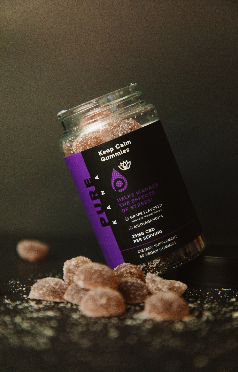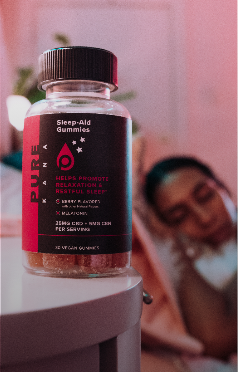An estimated one-third of adults in the USA get less than the recommended seven hours of sleep each night. And while the odd restless night is nothing to be too worried about, regularly losing sleep could cause long-term issues.
Poor sleep can lead to a range of problems, from daytime drowsiness to chronic health conditions. It can negatively influence mood, impact work and school performance, and increase the risk of accidents. Moreover, an ongoing lack of sleep is associated with weight gain, diabetes, heart disease, and depression.
Unsurprisingly, people who suffer from poor sleep are desperate for a solution. Some medications can help, but these tend to cause side effects such as excessive tiredness the following day. Therefore, many individuals are keen to find a natural alternative.
This has led to an increased interest in CBD for insomnia and other sleep disorders. Indeed, a growing number of people are considering trying the cannabinoid as a sleep aid. But is it really effective?
This article explores the science behind CBD oil for sleep and how to take it for optimal results. Here’s all you need to know.
Why Are People Excited About CBD for Sleep?
Getting enough sleep is critical for maintaining good physical and mental health. However, a large proportion of the population experiences poor sleep on a nightly basis.
There are numerous reasons why so many people fall short of the recommended seven hours each night. Insomnia is an increasingly common problem and can make falling or staying asleep a challenge. Some people also struggle with waking early and being unable to get back to sleep.
Sleep can also be disrupted by medical conditions such as restless legs syndrome or sleep apnea. Meanwhile, chronic pain can make it difficult to get comfortable and may result in waking throughout the night. Moreover, issues like anxiety and PTSD can cause nightmares that make getting a good night’s sleep virtually impossible.
Shift work can also play havoc with your sleep cycle and is associated with various long-term issues. And some people simply have difficulty unwinding after a hectic day.
Unfortunately, the treatment options for sleep disorders are somewhat limited. Medication can be effective but often causes unwanted side effects. Some prescription medicines can even cause dependence, with people experiencing worse sleep problems when they try to stop taking them.
Therefore, more and more people are seeking safe and natural sleep aids. This is where cannabidiol (CBD) comes into the picture. It is a non-intoxicating cannabinoid and is usually extracted from industrial hemp.
The compound is known to promote relaxation, and a growing number of people are trying CBD as a sleep aid. Indeed, many brands are now producing CBD oil and other products specifically for sleep.
Does CBD Help with Sleep?
Scientists are still working to unravel the mysterious connection between CBD and sleep. However, the endocannabinoid system (ECS) likely plays a vital role.
The ECS is a biological system that significantly influences many of our bodies’ functions, including mood, appetite, and sleep. It seems that the ECS affects our circadian rhythm, the in-built body clock that controls our sleep-wake cycles.
Many different factors can affect our circadian rhythms, including exposure to light and darkness, caffeine, alcohol, stress, and more. Cannabinoids like CBD could also have an impact because of the way they interact with the ECS.
CBD appears to increase the activity of certain chemicals within the ECS. Therefore, it could help enhance specific ECS functions, such as supporting healthy sleep cycles.
CBD users also report that it promotes a calm mood and eases physical discomfort, both of which could contribute to a better night’s sleep.
How Much CBD for Sleep?
There is no standard CBD dosage for sleep. How much a person needs will depend on several factors, including body weight, genetics, and general health.
When trying out CBD for the first time, it is generally best to start with a small amount and increase it gradually.
However, some studies show that small amounts of CBD could have energizing rather than relaxing effects. That said, more research is necessary, and individuals should experiment to find out what works best for them.
Another option is to try a CBD product specifically designed for sleep support. For example, our PureKana Sleep-Aid Gummies each contain 25mg of CBD and 5mg of CBN to help promote healthy sleep cycles. They also contain melatonin, a naturally-occurring hormone that plays a fundamental role in our circadian rhythms, and a blend of herbal extracts known for their calming properties.
How to Take CBD Oil for Sleep
The best time to use CBD for sleep depends on the administration route and individual biochemistry. Some forms act more quickly than others, and everyone reacts differently.
Therefore, it may be necessary to experiment over a few nights to find out what works best.
Generally speaking, though, it is best to take CBD oil for sleeping an hour or so before bedtime.
Combining CBD with good sleep hygiene is also advisable for the best results. Some examples of healthy sleep habits include:
- Going to bed and waking up at the same time each day
- Getting sufficient daylight exposure, especially in the morning
- Lowering the lights in the evening and avoiding blue light from electronic screens before bed
- Reducing caffeine and alcohol intake
- Not eating large meals late at night
- Engaging in physical activity during the day, but not immediately before bed
- Practicing relaxation techniques such as meditation or breathing exercises before bed
- Making sure the bedroom is sufficiently dark and quiet
- Investing in a comfortable mattress and high-quality bedding
- Wearing an eye mask and earplugs if necessary
If the above steps do not help to improve your sleep patterns, it may be worth consulting a physician. Keep a sleep diary for ten days before your appointment, noting sleeping and waking times, naps, exercise, alcohol, and caffeine consumption. This will assist the doctor in making an accurate diagnosis and recommending the most suitable treatment.
CBD and Sleep: Summary
An ever-growing number of people are using CBD as a sleep aid, and the cannabinoid may have numerous benefits. By interacting with the body’s ECS, it could potentially promote relaxation and help support our natural sleep cycles.
The best products combine CBD with a range of other calming ingredients for maximum effect. However, it is also essential to practice good sleep hygiene and consult a physician if the problem persists.
- https://www.cdc.gov/sleep/index.html
- https://www.cdc.gov/sleep/about_sleep/cant_sleep.html
- https://www.hsph.harvard.edu/nutritionsource/sleep/
- https://www.ncbi.nlm.nih.gov/pmc/articles/PMC7388834/
- https://www.med.upenn.edu/cbti/assets/user-content/documents/s11920-017-0775-9.pdf
- https://bmjopen.bmj.com/content/10/5/e034421
- https://www.liebertpub.com/doi/10.1089/can.2021.0006
- https://www.ncbi.nlm.nih.gov/pmc/articles/PMC4273450/









 https://premiumjane.com/
https://premiumjane.com/